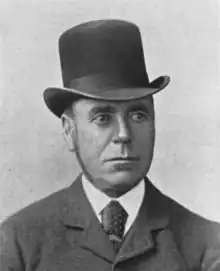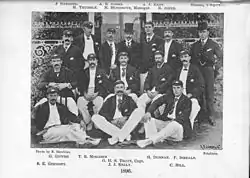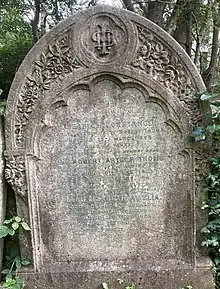Bob Thoms
Robert Arthur Thoms (19 May 1826 – 10 June 1903) was a cricket umpire who stood in two Test matches, the first two played in England, in 1880 and 1882.
Bob Thoms | |
|---|---|
 | |
| Born | Robert Arthur Thoms 19 May 1826 |
| Died | 10 June 1903 (aged 77) Regent's Park, London, United Kingdom |
| Nationality | English |
| Occupation(s) | Cricketer, cricket umpire |
| Years active | 1850–1851, 1863–1900 |
| Spouse | Elizabeth Constance Farley |
| Children | 4 |
| Cricket information | |
| Domestic team information | |
| Years | Team |
| 1850 | Marylebone Cricket Club |
| 1851 | All-England Eleven |
| Umpiring information | |
| Tests umpired | 2 (1880–1882) |

Life and career
Thoms was born in Marylebone, London. His father was part-proprietor of a cricket ground in Middlesex. Thoms attended a "good school", where he learnt Latin and Greek.[1]
Thoms appeared as a player in three first-class cricket matches in 1850 and 1851: one for an Under 36 XI, one for Marylebone Cricket Club and Metropolitan Clubs and one for the All England Eleven.[2] He was a fine fieldsman and an excellent sprinter over 100 yards.[3]
Thoms' long umpiring career lasted from 1863 to 1900 and encompassed 244 first-class matches, including the first two Test matches played in England, between England and Australia at The Oval in 1880 and 1882.[4] When he died, The Times said that he was "the most famous umpire the game has known".[5] The Australian Test captain Joe Darling said, "Thoms was about the only umpire in England who was not afraid of Grace or anyone else."[6] The weekly magazine Cricket said:
He was universally regarded as the umpire of the period, imperturbable, accurate and prompt in his decisions, and a great authority on the laws of the game. Unlike most umpires who, when they have given a decision, decline to argue or discuss the matter, he had a habit of explaining just what had happened, and as he very seldom made a mistake, his comments were always heard with respect and often admiration.[1]
Thoms frequently wrote articles on cricket for the sporting press, "always having something interesting to say in quaint language, which was charming and entirely his own".[1]
He and his wife, the former Elizabeth Constance Farley, had four children, two of whom died in infancy. She died in 1898; he died after a long illness in 1903 at Regent's Park, London.[2][7] They are buried in a family grave on the eastern side of Highgate Cemetery.

References
- W. A. Bettesworth, "Robert Thoms: Some Reminiscences", Cricket, 18 June 1903, pp. 209–10.
- "Robert Thoms". CricketArchive. Retrieved 27 September 2020.
- Seventy-One Not Out, by William Caffyn, William Blackwood & Sons, Edinburgh and London, 1899, p. 24.
- "Robert Thoms as Umpire in First-Class Matches". CricketArchive. Retrieved 27 September 2020.
- Wisden Cricketers' Almanack, 1904 edition, obituary notice.
- Quoted in Derek Birley, The Willow Wand, Simon & Schuster, London, 1989, p. 34.
- "Robert Arthur Thoms". Ancestry. Retrieved 27 September 2020.
External links
- Cricinfo profile (including his Wisden obituary notice)